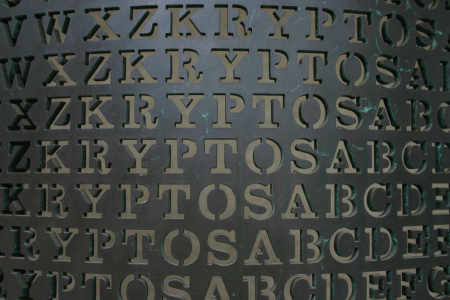Teaching Cryptography, Writing History
 Cross-posted from Wonders & Marvels.
Cross-posted from Wonders & Marvels.
When you teach mathematics, it’s not every semester that a major motion picture is released that’s squarely on-topic for your course. Then again, the math course I’m teaching this fall isn’t your typical math course.
At Vanderbilt University, where I teach mathematics, every first-year undergraduate in the College of Arts & Science is required to take a first-year writing seminar, and every department is required to offer one. The English and philosophy departments offer plenty, but mathematics? Writing seminars aren’t the kind of courses that come naturally to us.
A few years ago, I volunteered to try my hand at teaching a writing seminar. My day job is directing the Vanderbilt Center for Teaching, so I’ve talked to many instructors from a variety of disciplines about teaching different kinds of courses, and I was eager to teach something other than my usual statistics and linear algebra courses. What would it be like to teach a writing seminar?
The course I put together is called “Cryptography: The History and Mathematics of Codes and Ciphers.” This fall is my third time offering the course, and it’s now my favorite course to teach. It’s an unusual blend of pure mathematics, puzzle solving, history, current events, and, yes, writing. One of my favorite aspects of the course is that the students who take it are generally very interested in the topic. First-years have a lot of writing seminars to choose from, so those who select my cryptography course usually bring with them a high degree of interest in the subject. That’s not the case for my statistics course!
What does it mean to teach writing in a mathematics course? It took me a couple of iterations of the course to develop a good answer to that question, but I think I have one. Effective mathematics writing involves explaining the math you want your audience to learn in a way that makes sense to them, given their mathematical backgrounds. (In that respect, good writing has something in common with good teaching.)
To give my students the opportunity to practice this aspect of mathematics writing with an authentic audience, two years ago I partnered with Holly Tucker, a fellow faculty member at Vanderbilt and editor of the collaboratively authored history blog Wonders & Marvels. My students produced a series of essays on the history of cryptography, and Holly published a selection of these essays on Wonders & Marvels.
Before the students got to work, Holly visited my class and talked with them about the kind of posts that she published on her blog and about the audience who reads them. I believe that this gave my students a far more concrete sense of audience for their writing than they would have had with a more generic writing assignments and that this, in turn, helped them produce better writing. Also very helpful: Holly’s feedback to the students on their submissions, in her role as editor.

That was two years ago. This fall, Holly and I partnered again, and the assignment has a special relevance. That major motion picture I mentioned? It’s The Imitation Game, a biopic on the British codebreaker, mathematician, and computer scientist Alan Turning, featuring none other than Benedict Cumberbatch in the lead role. Turing’s creative genius was instrumental in cracking the German Enigma cipher, which in turn was a critical part of the Allied victory in World War II. The Imitation Game opens in the US next week, on November 28th.
In my cryptography seminar, we spend a week on World War II military cryptography, with an emphasis on Turing and his fellow codebreakers at Britain’s Bletchley Park. I was thrilled to find out that The Imitation Game would be released while the course was running this fall. Holly and I decided to run my students’ posts on the history of cryptography this week, just before the US release of the film. The posts have been running all this past week, and you can read them all here.
To the Wonders & Marvels readers, I hope you’ve found my students’ essays interesting. The students have done some great work, and they’ve enjoyed writing for you. I also hope you’ll go see The Imitation Game. It’s receiving stellar reviews—and it’s already in theaters in the UK! My students will be on Thanksgiving break when it opens in the US, but we’re planning to go see it as a class on December 1st when we’re all back on campus. A class trip to the movies for a math course? I can’t wait!
Image: “Kryptos,” Ritchie Rozelle, Flickr (CC-BY-NC-SA)